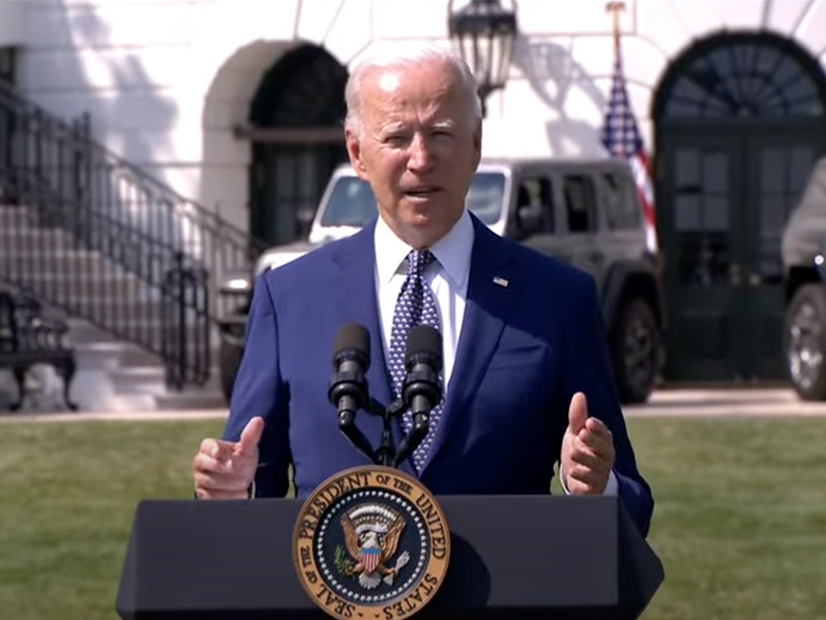
President Biden on Thursday set the nation on the road to electric cars and trucks, announcing in an afternoon press conference outside the White House that the administration has set a target of 50% of cars sold in 2030 be electric or hybrid electric.
In the last several years, annual new car sales have averaged about 17 million. EV now account for about 2% of annual sales, and heavy-duty battery electric trucks are only in the prototype phase, making the presidential order one that few auto industry analysts believe can be reached.
The transportation sector of the nation’s economy is responsible for 29% of greenhouse gas emissions, the largest of any single sector, according to EPA.
The White House also announced that EPA and the Department of Transportation are continuing to work to set new corporate vehicle emission and fuel efficiency standards to replace the Trump administration’s rollback of standards set by the Obama administration.
The EPA under former President Barack Obama had called for efficiency standards to increase 5% annually through 2023. President Donald Trump’s EPA then reduced that increase to 1.5% annually. The agency on Thursday said it would increase the standards by 10% in 2023 and then 5% each year through 2026, for a corporate average of 54 mpg by that year. The agency is also working on new truck emission standards.
The administration’s EV plan includes a tax provision to motivate buyers. It would boost the current $7,500 tax rebate to $12,500 for vehicles assembled in the U.S. in plants that meet certain labor standards. After five years, the full $12,500 would apply to vehicles that are either union-made or continue to meet “focused labor standards.”
In his remarks, the president framed his message largely in terms of global hegemony rather than one of combating climate change by decarbonizing transportation, a theme that Energy Secretary Jennifer Granholm has stressed for weeks in a series of public events. And when the president did mention climate, it was in the context of job creation.
“We’re in competition with China and many other nations for the 21st century,” Biden said. “To win, we’re going to have to make sure the future will be made in America. There’s no turning back. The question is whether [we] will lead or fall behind in the race for the future. It’s whether we’ll build these vehicles and the batteries … in the United States, [or] have to rely on other countries for those batteries. …
“Right now, China … is one of the largest and fastest growing electric vehicle markets in the world. And a key part of an electric vehicle is the battery. Right now 80% of the manufacturing capacity for these batteries is done in China.”
Noting that the infrastructure bill now pending in Congress would foster the building of 500,000 electric charging stations across the nation, Biden also said that the legislation would allow the government to fund the “retooling” of the nation’s manufacturing infrastructure through grants and loans.
We “are going to boost our manufacturing capacity [with] grants to kickstart new battery parts production, loans and tax credits to boost manufacturing … these clean vehicles. … This will help innovate manufacturing build the supply chains for batteries, semiconductors and those small computer chips that electric trucks and cars are going to be even more reliant upon as we move forward.”
Standing beside the president, Bernie Ricke — president of UAW Local 600, which represents auto workers in southeast Michigan — opened the press conference following Biden’s speech. Top national UAW labor leaders; executives from General Motors (NYSE:GM), Ford (NYSE:F) and Stellantis; and Democratic lawmakers gathered to hear the president.
The automakers issued a joint statement in support of the president’s goals.
“Today, Ford, GM and Stellantis announce their shared aspiration to achieve sales of 40 to 50% of annual U.S. volumes of electric vehicles (battery electric, fuel cell and plug-in hybrid vehicles) by 2030 in order to move the nation closer to a zero-emissions future consistent with Paris climate goals,” they said. “Our recent product, technology and investment announcements highlight our collective commitment to be leaders in the U.S. transition to electric vehicles. …
“With the UAW at our side in transforming the workforce and partnering with us on this journey, we believe we can strengthen continued American leadership in clean transportation technology through electric vehicle innovation and manufacturing.”
BMW, Ford, Honda, Volkswagen and Volvo also issued a joint statement.
“We were proud to stand with California to establish progressive new greenhouse gas regulations, and we remain committed to leading the industry in fighting against climate change. That’s why we support the administration’s goal of reaching an electric vehicle future and applaud President Biden’s leadership on reducing emissions and investing in critical infrastructure to achieve these reductions,” they said.
UAW President Ray Curry issued a separate statement in support and echoing Biden’s concerns about global competitors.
“We are at a critical time for the auto industry as countries compete to build the vehicles of the future. We are falling behind China and Europe as manufacturers pour billions into growing their markets and expanding their manufacturing. We need to make investments here in the United States,” he said.
“EEI and our member companies … commend the Biden administration for proposing new rules to help reduce emissions from passenger and other light-duty vehicles,” Edison Electric Institute President Tom Kuhn said. “We are committed to working with President Biden and other leaders across the administration to help build the electric vehicle charging infrastructure we need to accelerate the electrification of the transportation sector and reduce vehicle emissions.”


